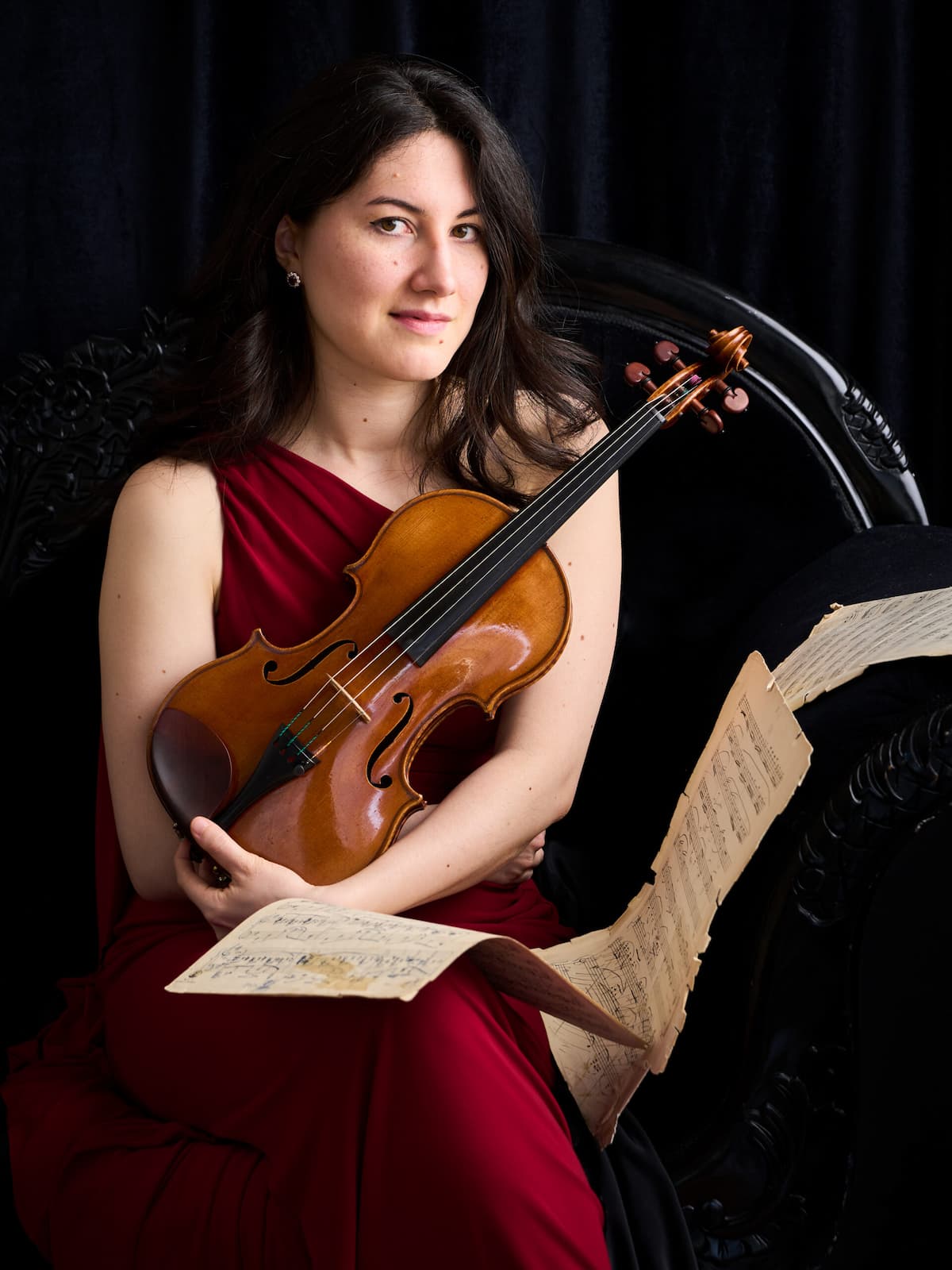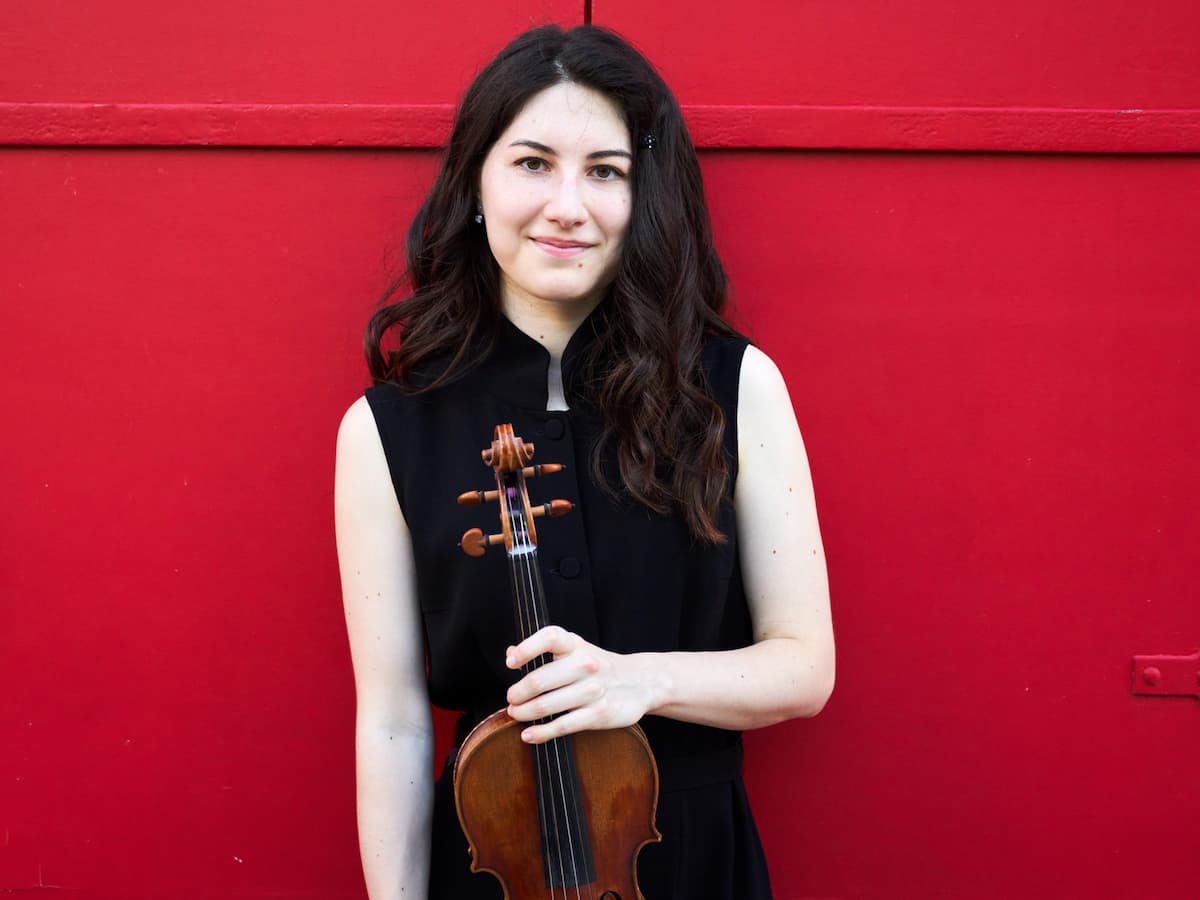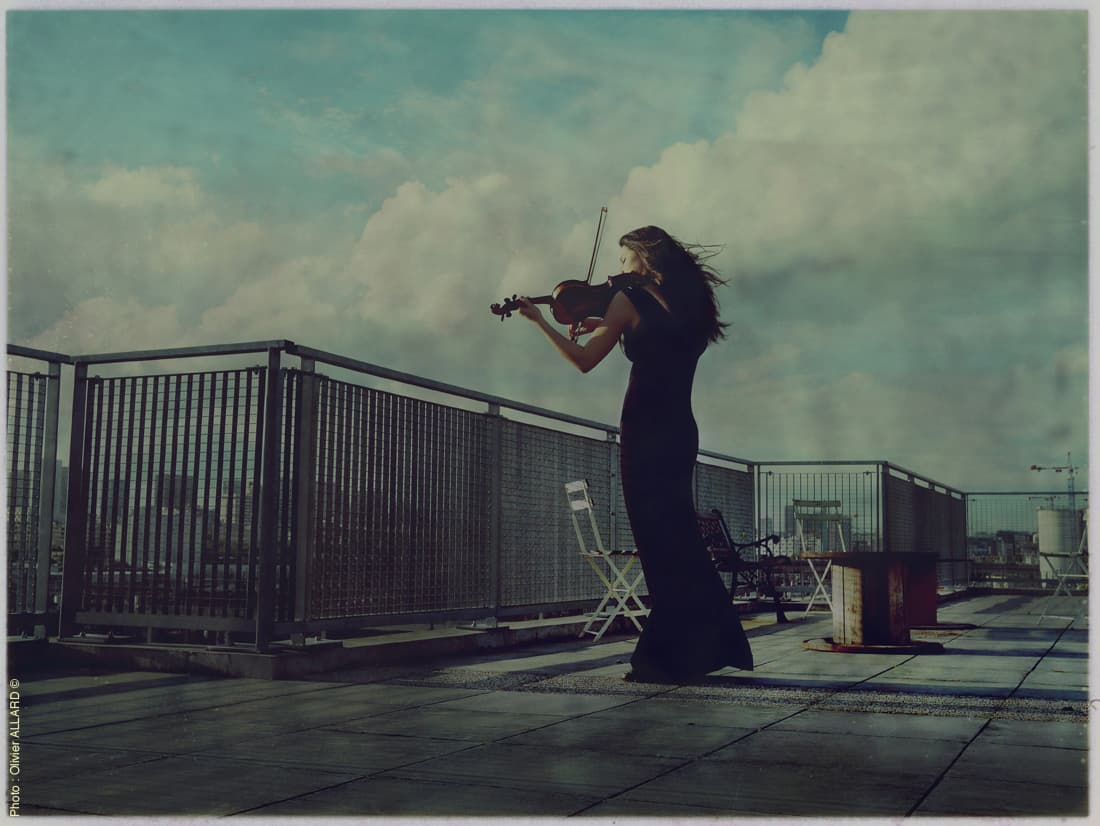‘It’s Always The Music First’

Irène Duval © Kaupo Kikkas
Award-winning violinist Irène Duval has earned a reputation for ‘her mastery of phrasing and dramatic dimension’ (Diapason), and ‘astonishing virtuosity’ (Revelations Classiques). Her career has already taken her around the world, with collaborations and appearances across Europe, Asia and Australia. She regularly performs with musicians including Joshua Bell, Steven Isserlis, Jeremy Denk and Jean-Efflam Bavouzet, and has performed concerti with such orchestras as the Dresdner Philharmonie, Royal Philharmonic Orchestra, the Royal Northern Sinfonia and the Philharmonia Orchestra.
A keen chamber musician, Irène regularly participates at the International Musicians Seminar in Prussia Cove each year, along with festivals in Norway, Poland, Germany, Austria and Australia.
Irène’s recent album Fauré and Friends, recorded earlier this year with pianist Angus Webster and released this September on the Capriccio label, pairs pieces by Fauré with works of his contemporaries Saint-Saëns, George Enescu and Reynaldo Hahn. Irène has learned and performed all of Fauré’s violin music throughout her career, and in November is taking part in a series of concerts at London’s Wigmore Hall to commemorate the centenary of Fauré’s death.
Fauré’s music has held a special place in Irène’s heart since she discovered his first piano quintet back in 2016 – and this relationship has only deepened since then. I talk to her about her love for Fauré, what his music means to her now, and the parallels Irène has found between music and a recently discovered hobby of hers.
Fauré, Violin Sonata n°2 in E minor, Op.108 | Irène Duval
How and when did you start playing the violin?
My father was a chef, and didn’t know anything about classical music. My mother, on the contrary, was passionate about it. She wasn’t a musician herself but was a keen amateur singer and gave me the chance to learn music.
It started with piano lessons when I was 4, then singing in a choir. It was actually while I lived in Hong Kong – because of my father’s work, I spent my first few years in Japan, Indonesia and Hong Kong – that I became very interested in the violin, seeing the school orchestra and some friends playing this instrument.
It’s difficult to say what happened at that moment, I just felt a sudden passion for it. I was fascinated by the fact that you can sculpt this gorgeous sound out of a piece of wood and a few horse hairs. I thought it was magical.
At the end of the school day my mother was quite surprised to find me so eager to learn this instrument! She was really supportive, and that was great.
Who inspired you when you were younger?

© Kaupo Kikkas
I wasn’t inspired so much by a particular musician when I was young. It was the music in general, how it made me feel.
As a young teenager, I was inspired by the recordings my mother owned. I didn’t use the internet then – it sounds strange to think of that now, but I only had these recordings, and I was very much inspired by the figure of Anne-Sophie Mutter, whom I saw as a beautiful and successful woman who made wondrous sounds. Back then, that image motivated me: the sense of a powerful woman in a world that seemed to be led by men.
In 2016, I met Steven Isserlis who had a huge impact on me, and my musical development. His playing was like no one else’s: beautifully sincere, moving and natural. His love and care for music and composers really broadened my understanding of music-making and its basics.
A year later, I went for the first time to the International Musicians Seminar at Prussia Cove, and it changed my life as a musician. You arrive in an environment where competitions and prizes aren’t important; all that matters is the deep connection one creates with the music one is learning and playing; one is surrounded by musicians who really care about it.
Technical perfection is impressive and convincing, but it shouldn’t be at the expense of spontaneity; imperfections can express so many things. Once you remove all of them, you lose some charm and authenticity.
I draw inspiration from all things in life. The different styles of playing of the musicians with whom I collaborate interest me very much. I feel that I learn something from everyone I meet.
Your recent album pairs Fauré’s music with his contemporaries. Do you remember when you first discovered Fauré, and what does his music mean to you now?
When I was studying at the Paris Conservatoire, I heard Fauré’s first violin sonata during a lesson. I’d never heard this piece before, and I loved it because it was so full of gorgeous melodies and harmonies and yet so exciting.
My obsession with Fauré started in 2016 when I played Fauré’s first piano quintet with Steven Isserlis at the Kronberg Academy’s chamber music festival. I remember listening to recordings of the piece beforehand to prepare myself, and I just couldn’t understand anything! That’s how you realise how important the interpretation is for complex pieces such as this one. Either the musicians understand them and make them comprehensible to the listeners, or they don’t, and the music just doesn’t make sense to an audience.
That experience led me to discover Fauré’s later pieces. I felt a deep love for them because they have such an incredible variety of harmonic colours, depth, and beauty. It was like tasting a wonderful dish with unusual pairings of ingredients and textures, which at first startles you – but the more you taste it, the more you appreciate the subtleties and the more you get to love them. Fauré says that music is something that ‘elevates us far above what is’; it takes you to ideal worlds. I love his music because it’s never dark or depressing, it feels like a hug to the soul.
How was it to dive into Fauré’s life and music while preparing for the recording?

© Olivier Allard
I love the fact that Fauré seemed to be as good-hearted and positive as his compositions. As a teacher of many wonderful students – including Nadia Boulanger, Ravel, and Enescu – he didn’t step on their musical personalities. He would try to understand the particularities of each one of them in order to help them develop.
Fauré was completely devoted to music. What gave him the deepest pleasure was to work on his art. His total sincerity is perhaps part of the reason why his career took off late, in his thirties, because he lacked ambition for his career. It was really his own teacher, Saint-Saëns, who was like a father to him, who helped him and supported him.
I feel close to that trait of his nature because my main ambition is to interpret music as sincerely as I can and communicate it to others. Of course, I want to bring music to as many people as possible, but I’m not seeking success for its own sake. It’s always the music first.
I recorded this album at a time when I felt I identified with Fauré’s language and that I was in an appropriate state to play his music.
What do you do in your spare time?
Right after the recording sessions, I started learning sewing, and it has become a new passion. Since then, I’ve been making a few clothes. My first evening dress had its first outing when I went for the first time to an opera at Glyndebourne… My dream would be to make my own concert outfits.
Dressmaking takes a lot of time, so it’s not easy to be consistent with all the travelling of a musician, but when I get to it, it always feels refreshing and satisfying. Pattern making is also very stimulating. It’s good to get new perspectives through learning other skills.
I’ve become aware of some parallels with music making. Pattern-making feels like composing a piece, and dress-making would be the interpretation. There is a lot of thought going on before the work on the instrument or the sewing machine. What is the form of the piece of music or dress? What is the story behind it? Which fabric will best express this or that emotion? How will it allow itself to be structured in the way that you want? There are other parallels, like the need for precision – and perhaps perfection. You have to be patient – maybe more with sewing, I don’t know. But maybe that’s also because I’m a beginner!
Find Irène’s album Fauré and Friends here, along with details of the Wigmore Hall Fauré series here.
For more of the best in classical music, sign up for our E-Newsletter





I was lucky enough to attend Irène’s concert at the University of Birmingham, U.K. on 14th March 2025. She stepped in at the last minute for this concert and gave a beautiful, technically superb, performance of pieces by Bach, Ysaÿe, Tavener and Finzi.